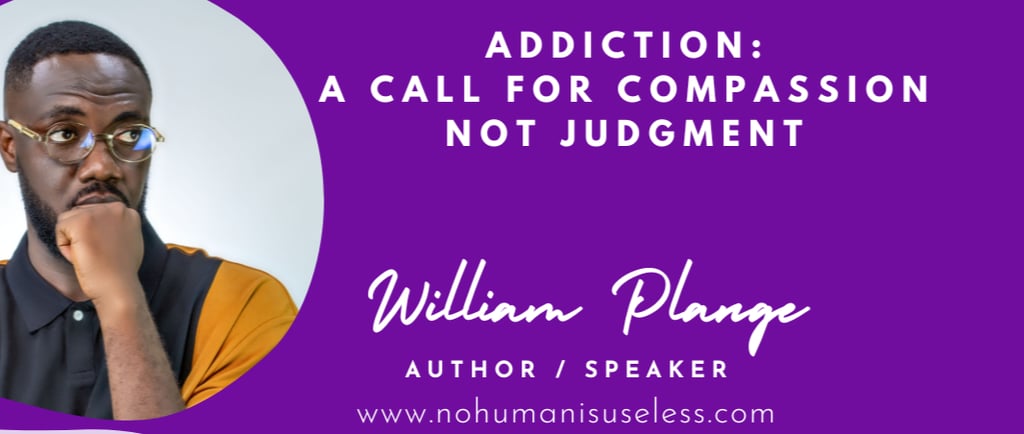Addiction: A Call for Compassion, Not Judgment
Today, I want to talk about ADDICTION. We live in a world where people are quick to judge those struggling with addiction. Whether it’s smoking, alcohol, drugs, sex, gambling, or even something as common as phone addiction, society often labels addicts as weak, irresponsible, or lacking self-control. But the truth is, addiction is not just a bad habit—it’s a deep and complex struggle that many people desperately want to overcome but find incredibly difficult. My Personal Battle with Phone Addiction Recently, I realized that I have become addicted to my phone. I find myself scrolling aimlessly for hours, doing nothing meaningful when I could be building my network, sending important emails, or working on proposals for impactful institutions. It hit me that I was wasting valuable time—time that I could use to be productive and grow. So yesterday, I decided to challenge myself. I told myself, “Stay away from your phone for just 30 minutes.” It sounded easy. But to my surprise, instead of breaking free, my addiction grew worse. I found myself reaching for my phone even more, and before I knew it, I had wasted most of my day. This small experience made me reflect on how we judge people who are addicted to smoking, sex, drugs, and other vices. It made me realize how quick we are to draw conclusions about others without ever stepping into their shoes. If I, someone who recognizes the problem and actively wants to change, struggled to stay away from my phone for just 30 minutes, how much harder must it be for someone battling an addiction they’ve carried for years? Article content Why Addiction is More Than Just a Choice Many people assume addiction is a simple matter of willpower—that quitting is just about making a firm decision and sticking to it. But addiction is far more complex than that. It has psychological, emotional, and even spiritual dimensions. Here’s why: Addiction Rewires the Brain: Scientific research shows that addiction alters the brain’s reward system, making it extremely difficult to stop. The brain becomes dependent on the addictive substance or behavior to feel pleasure, and breaking free requires rewiring these patterns—a process that takes time and effort. Emotional Triggers: Many addictions stem from deeper emotional wounds—stress, trauma, loneliness, or depression. The addiction becomes a way to cope with pain, and without addressing the root cause, quitting becomes almost impossible. Society’s Pressure and Stigma: Addicts often face judgment, ridicule, and rejection from society. Instead of receiving support, they are shamed, making them feel even more isolated and hopeless. Spiritual and Mental Struggles: For many, addiction is not just physical but deeply spiritual. It can feel like a force beyond their control, requiring not only discipline but also prayer, self-reflection, and spiritual renewal to overcome. Breaking Free: A Journey of Discipline and Support If we truly want to help those struggling with addiction, we need to change our mindset. Instead of condemning, let’s support. Instead of ridiculing, let’s encourage. Healing from addiction requires: Discipline and Patience: Overcoming addiction is a gradual process. There will be setbacks, but persistence is key. A Support System: Family, friends, and communities need to provide encouragement instead of shame. Professional Help: Therapy, counseling, and rehabilitation programs can provide structured guidance. Faith and Prayer: For those who believe, spiritual strength can be a powerful tool in breaking free from addiction. A Call for Compassion Addiction is not just a habit—it’s a battle. And every person struggling with addiction is fighting a war that many of us cannot see or understand. Instead of judging, let’s offer a helping hand. Let’s create a world where people feel safe enough to seek help without fear of shame. STOP JUDGING. START UNDERSTANDING. No human is useless, and no one is beyond redemption. If you or someone you know is struggling with addiction, know that change is possible. It starts with self-awareness, a strong support system, and a willingness to take small but steady steps toward freedom.
William Plange
7/1/20251 min read


Overcoming depression together.
P.o.Box co 3061, Tema
34 Nii Ayiku Street,
Near Queensland Primary School, Nungua
Ghana.
© 2025. by William Plange All rights reserved.
GET IN TOUCH
Phone - +233508290814
Email - info@nohumanisuseless.com
willplange@gmail.com
No Human is Useless is a legally registered non-profit organization under the name NO HUMAN IS USELESS LBG, with registration number CG075061024, by the Registrar General's office in Ghana on 21st October 2024
